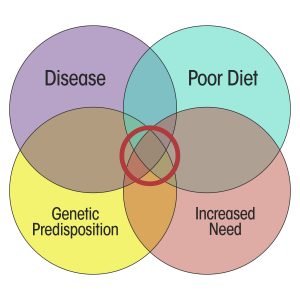Are You Just Wasting Your Money On Supplements?
Author: Dr. Stephen Chaney
 You’ve seen the headlines. “Recent Study Finds Vitamin and Mineral Supplements Don’t Lower Heart Disease Risk.” You are being told that supplements are of no benefit to you. They are a waste of money. You should follow a healthy diet instead. Is all of this true?
You’ve seen the headlines. “Recent Study Finds Vitamin and Mineral Supplements Don’t Lower Heart Disease Risk.” You are being told that supplements are of no benefit to you. They are a waste of money. You should follow a healthy diet instead. Is all of this true?
If I were like most bloggers, I would give you a simple yes or no answer that would be only partially correct. Instead, I am going to put the study behind these headlines into perspective. I am going to give you a deeper understanding of supplementation, so you can make better choices for your health.
Should we use supplements for cardiovascular health?
In today’s article I will give you a brief overview of the subject. Here are the topics I will cover today:
- Is this fake news?
- Did the study ask the right questions?
- Is this a question of “Garbage In – Garbage Out?“
- Reducing Heart Disease Risk. What you need to know.
All these topics are covered in much more detail (with references) in my book “Slaying The Supplement Myths”, which will be published this fall.
How Was This Study Done?
 This study (D.J.A. Jenkins et al, Journal of the American College Of Cardiology, 71: 2540-2584, 2018 ) was a meta-analysis. Simply put, that means the authors combined the results of many previous studies into a single database to increase the statistical power of their conclusions. This study included 127 randomized control trials published between 2012 and December 2017. These were all studies that included supplementation and looked at cardiovascular end points, cancer end points or overall mortality.
This study (D.J.A. Jenkins et al, Journal of the American College Of Cardiology, 71: 2540-2584, 2018 ) was a meta-analysis. Simply put, that means the authors combined the results of many previous studies into a single database to increase the statistical power of their conclusions. This study included 127 randomized control trials published between 2012 and December 2017. These were all studies that included supplementation and looked at cardiovascular end points, cancer end points or overall mortality.
Before looking at the results, it is instructive to look at the strengths and weaknesses of the study. Rather than giving you my interpretation, let me summarize what the authors said about strengths and weaknesses of their own study.
The strengths are obvious. Randomized control trials are considered the gold standard of evidence-based medicine, but they have their weaknesses. Here is what the authors said about the limitations of their study:
- “Randomized control trials are of shorter duration, whereas longer duration studies might be required to fully capture chronic disease risk.”
- “Dose-response data were not usually available [from the randomized control studies included in their analysis]. However, larger studies would allow the effect of dose to be assessed.”
There are some other limitations of this study, which I will point out below.
Is This Fake News?
 When I talk about “fake news” I am referring to the headlines, not to the study behind the headlines. The headlines were definitive: “Vitamin and Mineral Supplements Don’t Lower Heart Disease Risk.” However, when you read the study the reality is quite different:
When I talk about “fake news” I am referring to the headlines, not to the study behind the headlines. The headlines were definitive: “Vitamin and Mineral Supplements Don’t Lower Heart Disease Risk.” However, when you read the study the reality is quite different:
- In contrast to the negative headlines, the study reported:
- Folic acid supplementation decreased stroke risk by 20% and overall heart disease risk by 17%.
-
- B complex supplements containing folic acid, B6, and B12 decreased stroke risk by 10%.
- That’s a big deal, but somehow the headlines forgot to mention it.
- The supplements that had no significant effect on heart disease risk (multivitamins, vitamin D, calcium, and vitamin C) were ones that would not be expected to lower heart disease risk. There was little evidence from previous studies of decreased risk. Furthermore, there is no plausible mechanism for supposing they might decrease heart disease risk.
- The study did not include vitamin E or omega-3 supplements, which are the ones most likely to prove effective in decreasing heart disease risk when the studies are done properly (see below).
Did The Study Ask The Right Question?
Most of the studies included in this meta-analysis were asking whether a supplement decreased heart disease risk or mortality for everyone. Simply put, the studies started with a group of generally healthy Americans and asked whether supplementation had a significant effect on disease risk for everyone in that population.
That is the wrong question. We should not expect supplementation to benefit everyone equally. Instead, we should be asking who is most likely to benefit from supplementation and design our clinical studies to test whether those people benefit from supplementation.
 I have created the graphic on the right as a guide to help answer the question of “Who is most likely to benefit from supplementation?”. Let me summarize each of the points using folic acid as the example.
I have created the graphic on the right as a guide to help answer the question of “Who is most likely to benefit from supplementation?”. Let me summarize each of the points using folic acid as the example.
Poor Diet: It only makes sense that those people who are deficient in folate from foods are the most likely to benefit from folic acid supplementation. Think about it for a minute. Would you really expect people who are already getting plenty of folate from their diet to obtain additional benefits from folic acid supplementation?
The NIH estimates that around 20% of US women of childbearing age are deficient in folic acid. For other segments of our population, dietary folate insufficiency ranges from 5-10%. Yet, most studies of folic acid supplementation lump everyone together – even though 80-95% of the US population is already getting enough folate through foods, food fortification, and supplementation. It is no wonder most studies fail to find a beneficial effect of folic acid supplementation.
The authors of the meta-analysis I discussed above said that the beneficial effects of folic acid they saw might have been influenced by a very large Chinese study, because a much higher percentage of Chinese are deficient in folic acid. They went on to say that the Chinese study needed to be repeated in this country.
In fact, the US study has already been done. A large study called “The Heart Outcomes Prevention Evaluation (HOPE)” study reported that folic acid supplementation did not reduce heart disease risk in the whole population. However, when the study focused on the subgroup of subjects who were folate-deficient at the beginning of the study, folic acid supplementation significantly decreased their risk of heart attack and cardiovascular death. This would seem to suggest using supplements for cardiovascular health is a good idea.
Increased Need: There are many factors that increase the need for certain nutrients. However, for the sake of simplicity, let’s only focus on medications. Medications that interfere with folic acid metabolism include anticonvulsants, metformin (used to treat diabetes), methotrexate and sulfasalazine (used to treat severe inflammation), birth control pills, and some diuretics. Use of these medications is not a concern when the diet is adequate. However, when you combine medication use with a folate-deficient diet, health risks are increased and supplementation with folic acid is more likely to be beneficial.
Genetic Predisposition: The best known genetic defect affecting folic acid metabolism is MTHFR. MTHFR deficiency does not mean you have a specific need for methylfolate. However, it does increase your need for folic acid. Again, this is not a concern when the diet is adequate. However, when you combine MTHFR deficiency with a folate-deficient diet, health risks are increased and supplementation with folic acid is more likely to be beneficial. I cover this topic in great detail in my upcoming book, “Slaying The Supplement Myths”. In the meantime, you might wish to view my video, “The Truth About Methyl Folate.”
Diseases: An underlying disease or predisposition to disease often increases the need for one or more nutrients that help reduce disease risk. The best examples of this are two major studies on the effect of vitamin E on heart disease risk in women. Both studies found no effect of vitamin E on heart disease risk in the whole population. However, one study reported that vitamin E reduced heart disease risk in the subgroup of women who were post-menopausal (when the risk of heart disease skyrockets). The other study found that vitamin E reduced heart attack risk in the subgroup of women who had pre-existing heart disease at the beginning of the study.
Finally, if you look at the diagram closely, you will notice a red circle in the middle. When two or three of these factors overlap, that is the “sweet spot” where supplementation is almost certain to make a difference and it may be a good idea to use supplements for cardiovascular health.
Is This A Question Of “Garbage In, Garbage Out”?
 Unfortunately, most clinical studies focus on the “Does everyone benefit from supplementation question?” rather than the “Who benefits from supplementation?” question.
Unfortunately, most clinical studies focus on the “Does everyone benefit from supplementation question?” rather than the “Who benefits from supplementation?” question.
In addition, most clinical studies of supplementation are based on the drug model. They are studying supplementation with a single vitamin or mineral, as if it were a drug. That’s unfortunate, because vitamins and minerals work together synergistically. What we need are more studies of holistic supplementation approaches.
Until these two things change, most supplement studies are doomed to failure. They are doomed to give negative results. In addition, meta-analyses based on these faulty supplement studies will fall victim to what computer programmers refer to as “Garbage In, Garbage Out”. If the data going into the analysis is faulty, the data coming out of the study will be equally faulty. It won’t be worth the paper it is written on. If you are looking for personal guidance on supplementation, this study falls into that category.
Should We Use Supplements For Cardiovascular Health?
If you want to know whether supplements decrease heart disease risk for everyone, this meta-analysis is clear. Folic acid may decrease the risk of stroke and heart disease. A B complex supplement may decrease the risk of stroke. All the other supplements they included in their analysis did not decrease heart disease risk, but the analysis did not include vitamin E and/or omega-3s.
However, if you want to know whether supplements decrease heart disease risk for you, this study provides no guidance. It did not ask the right questions.
I would be remiss, however, if I failed to point out that we know healthy diets can decrease heart disease risk. In the words of the authors: “The recent science-based report of the U.S. Dietary Guidelines Advisory Committee, also concerned with [heart disease] risk reduction, recommended 3 dietary patterns: 1) a healthy American diet low in saturated fat, trans fat, and meat, but high in fruits and vegetables; 2) a Mediterranean diet; and 3) a vegetarian diet. These diets, with their accompanying recommendations, continue the move towards more plant-based diets…” I cover the effect of diet on heart disease risk in detail in my book, “Slaying The Food Myths”.
The Bottom Line
You have probably seen the recent headlines proclaiming: “Vitamin and Mineral Supplements Don’t Lower Heart Disease Risk.” The study behind the headlines was a meta-analysis of 127 randomized control trials looking at the effect of supplementation on heart disease risk and mortality.
- The headlines qualify as “fake news” because:
- The study found that folic acid decreased stroke and heart disease risk, and B vitamins decreased stroke risk. Somehow the headlines forgot to mention that.
- The study found that multivitamins, vitamin D, calcium, and vitamin C had no effect on heart disease risk. These are nutrients that were unlikely to decrease heart disease risk to begin with.
- The study did not include vitamin E and omega-3s. These are nutrients that are likely to decrease heart disease risk when the studies are done properly.
- The authors of the study stated that a major weakness of their study was that that randomized control studies included in their analysis were short term, whereas longer duration studies might be required to fully capture chronic disease risk.
- The study behind the headlines is of little use for you as an individual because it asked the wrong question.
- Most clinical studies focus on the “Does everyone benefit from supplementation question?” That is the wrong question. Instead we need more clinical studies focused on the “Who benefits from supplementation?” question. I discuss that question in more detail in the article above.
- In addition, most clinical studies of supplementation are based on the drug model. They are studying supplementation with a single vitamin or mineral, as if it were a drug. That’s unfortunate, because vitamins and minerals work together synergistically. What we need are more studies of holistic supplementation approaches.
- Until these two things change, most supplement studies are doomed to failure. They are doomed to give negative results. In addition, meta-analyses based on these faulty supplement studies will fall victim to what computer programmers refer to as “Garbage In, Garbage Out”. If the data going into the analysis is faulty, the data coming out of the study will be equally faulty. It won’t be worth the paper it is written on. If you are looking for personal guidance on supplementation, this study falls into that category.
- If you want to know whether supplements decrease heart disease risk for everyone, this study is clear. Folic acid may decrease the risk of stroke and heart disease. A B-complex supplement may decrease the risk of stroke. All the other supplements they included in their analysis did not decrease heart disease risk, but they did not include vitamin E and/or omega-3s in their analysis.
- If you want to know whether supplements decrease heart disease risk for you, this study provides no guidance. It did not ask the right questions.
- However, we do know that healthy, plant-based diets can decrease heart disease risk. I cover heart healthy diets in detail in my book, “Slaying The Food Myths.”
For more details, read the article above.
These statements have not been evaluated by the Food and Drug Administration. This information is not intended to diagnose, treat, cure or prevent any disease.
